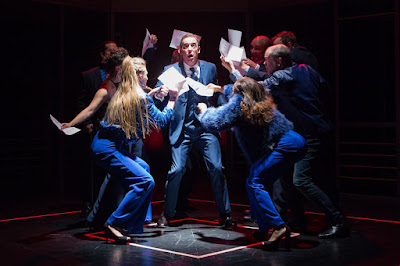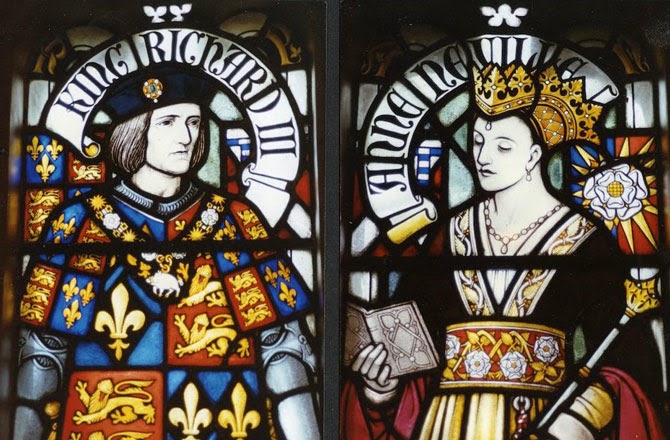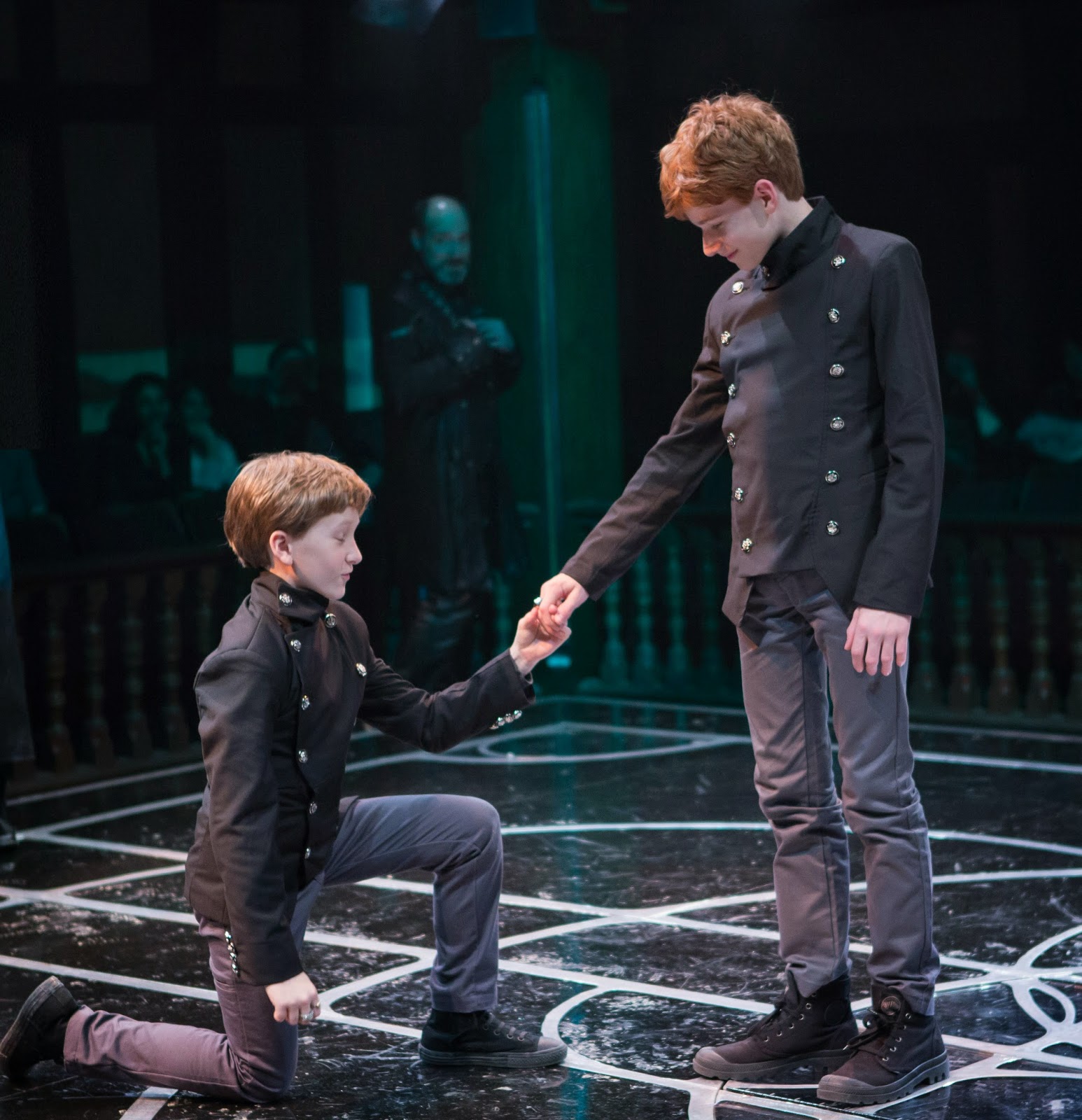Alison Luff is Nell Gwynn at Folger Theatre whose hat is bigger than your hat/Photo by Brittany Diliberto, Bee Two Sweet Photography
Sex, tarts, and miscellany!
So much of it is true. The whole thing is a delight, I dare say.
We have to thank King Charles II (1630-1685) for restoring theatre and fun, post-Puritans, to England. Had playwright Jessica Swale included all 13 of his mistresses in her play, we'd still be watching them at the theatre.
As it was, she only included three, 'twas enough and spirited they are!
Alison Luff is Nell Gwynn and Quinn Franzen is Charles Hart in Folger Theatre's Nell Gwynn/Photo by Brittany Diliberto, Bee Two Sweet Photography
The king's wife, Queen Catherine (1638-1705) (Zoe Speas in the role and a musician in the show) stayed married to him 'til death did them part, but that's another story to be told anon. She is the angry woman in black, although in real life (Wikipedia), she comes across as rather mousy. Nevertheless, her witchiness (portrayed in Nell) is quite understandable, given that she had many competitors (a practice, I understand, which still continues to this day).
Peter Lely (1618-1680), Catherine of Braganza, Queen of England, c. 1665/Wikimedia.org
R. J. Foster is the haughty king who does not overplay his role.
John Michael Wright (1617-1694), Portrait of Charles II in Garter Robes, National Portrait Gallery, London/Wikimedia Commons
Nell Gwynn, the play, is about Nell Gwynn (1650-1687), the actress (!) who is Alison Luff at Folger's, star of the king's stage and at the Folger, too.
And what bloomin' buffoonery it all is!
At the Folger (the East Cost premiere) and in real life, Ms. Gwynn did have an amour, Charles Hart, acted by the dashing Quinn Franzen, who does his squiring duties with Ms. Nell quite handsomely and gets her to the stage on time.
It doesn't take long for Thomas Killigrew (Nigel Gore) theatre manager and actor's broker, to succumb to the marvelous abilities of Ms. Gwynn and put her up in the "lights" (had there been any then).
She's got talent!
An experienced actor, the most dynamic Mr. Christopher Dinolfo, is Edward Kynaston, the female substitute in the theatre before King Charles II pardoned the women and let them act, too. The nerve of it all! Women acting as women!
Mr. Dinolfo was on stage far too short a time. He lost his parts.
The heartiest laughs sprang from the appearances by Catherine Flye, who has earned 13 (matching the king's mistress counts) Helen Hayes Award nominations, winning one. She has dual Folger roles as Nancy, a lady-in-waiting of sorts, and, briefly, as Nell's mom.
Her lines and mannerisms produce gales of glee, her roles crying for smiles all around as soon as the audience gets used to her antics and one-liners. (It didn't take long to realize she was the constant comic.)
A "tenured" mistress, Lady Castlemaine (Regina Aquino who plays dual roles) has her charms ripped asunder by new women on the block, including the prissy French token, Louise de Kéroualle (also Ms. Aquino) who exudes hilarity the short time she sashays down the promenade in regal "Frenchiness."
Because the audience is busy keeping up with the quick dialogue and fast scene changes, the excellent costuming by Mariah Anzaldo Hale does not receive the sufficient attention the designs warrant. They indeed help make the show and are breathtaking, under closer scrutiny by audience members who sit in proximity near the aisle where actors parade up and down.
Tony Cisek, set designer, hangs rich, red velvety drapes on either side of the stage which close and open and define the backdrop for some scenes which shift from front stage to back stage and back again with characters moving fore and aft. (You have to be there.)
The last ear count heard strolling musicians on banjos, guitars, mandolins, accordion, triangle, cello, and (I think) keyboard, all who added pleasant depth without dominating. I can't image the show without this music and applaud the composer, Kim Sherman.
Go and enjoy! You won't be the worse for it, but, like me, laughing lots more! I can't wait to see Ms. Swale's film version of Nell, now on the writing block.
Other members of the cast are Caitlin Cisco as Rose Gwynn, Nell's sister; Kevin Collins, musician; Michael Glenn, John Dryden, playwright who rapidly scribbled down lines for Nell Gwynn and was named poet laureate by the king.
Also, Jeff Keogh, Lord Arlington, the king's secretary of state; Alex Michell, who starts and ends the play theatrically.
Directing is Robert Richmond, who is also the chair and director of the University of South Carolina's department of theatre and dance.
Other members of the creative team are Andrew F. Griffin, lighting; Matt Otto, sound; Diane Healy, production stage manager; Jessica Short, assistant stage manager; Michele Osherow, resident dramaturg, Janet Alexander Griffin, artistic producer; and Beth Emelson, associate artistic producer.
What: Nell Gwynn by Jessica Swale
When: Now through March 10, 2019
Where: Folger Theatre, 201 East Capitol Street, S. E. Washington, D.C. 20003
Tickets: Buy online, by phone (202-544-7077), or at the box office. Tickets start at $42 with discounts for groups, persons under age 30, students, seniors, educators, members and family of the military.
Open-captioned performances: Sunday, March 3, 2 p.m. and 7 p.m., sponsored by Vinton and Sigrid Cerf
Free Folger Friday, March 1, 6 p.m. Before Nell Gwynn at 8 p.m., scholar Deborah Payne and actors will speak and share excerpts from the long-lost manuscript, The Country Gentleman, found in the Folger archives in 1973.
Metro station: Capitol South or Union Station
For more information: 202-544-4600 or info@folger.edu
patricialesli@gmail.com
Sex, tarts, and miscellany!
So much of it is true. The whole thing is a delight, I dare say.
We have to thank King Charles II (1630-1685) for restoring theatre and fun, post-Puritans, to England. Had playwright Jessica Swale included all 13 of his mistresses in her play, we'd still be watching them at the theatre.
As it was, she only included three, 'twas enough and spirited they are!
Alison Luff is Nell Gwynn and Quinn Franzen is Charles Hart in Folger Theatre's Nell Gwynn/Photo by Brittany Diliberto, Bee Two Sweet Photography
The king's wife, Queen Catherine (1638-1705) (Zoe Speas in the role and a musician in the show) stayed married to him 'til death did them part, but that's another story to be told anon. She is the angry woman in black, although in real life (Wikipedia), she comes across as rather mousy. Nevertheless, her witchiness (portrayed in Nell) is quite understandable, given that she had many competitors (a practice, I understand, which still continues to this day).
Peter Lely (1618-1680), Catherine of Braganza, Queen of England, c. 1665/Wikimedia.org
R. J. Foster is the haughty king who does not overplay his role.
John Michael Wright (1617-1694), Portrait of Charles II in Garter Robes, National Portrait Gallery, London/Wikimedia Commons
Nell Gwynn, the play, is about Nell Gwynn (1650-1687), the actress (!) who is Alison Luff at Folger's, star of the king's stage and at the Folger, too.
And what bloomin' buffoonery it all is!
At the Folger (the East Cost premiere) and in real life, Ms. Gwynn did have an amour, Charles Hart, acted by the dashing Quinn Franzen, who does his squiring duties with Ms. Nell quite handsomely and gets her to the stage on time.
It doesn't take long for Thomas Killigrew (Nigel Gore) theatre manager and actor's broker, to succumb to the marvelous abilities of Ms. Gwynn and put her up in the "lights" (had there been any then).
She's got talent!
An experienced actor, the most dynamic Mr. Christopher Dinolfo, is Edward Kynaston, the female substitute in the theatre before King Charles II pardoned the women and let them act, too. The nerve of it all! Women acting as women!
Mr. Dinolfo was on stage far too short a time. He lost his parts.
The heartiest laughs sprang from the appearances by Catherine Flye, who has earned 13 (matching the king's mistress counts) Helen Hayes Award nominations, winning one. She has dual Folger roles as Nancy, a lady-in-waiting of sorts, and, briefly, as Nell's mom.
Her lines and mannerisms produce gales of glee, her roles crying for smiles all around as soon as the audience gets used to her antics and one-liners. (It didn't take long to realize she was the constant comic.)
A "tenured" mistress, Lady Castlemaine (Regina Aquino who plays dual roles) has her charms ripped asunder by new women on the block, including the prissy French token, Louise de Kéroualle (also Ms. Aquino) who exudes hilarity the short time she sashays down the promenade in regal "Frenchiness."
Because the audience is busy keeping up with the quick dialogue and fast scene changes, the excellent costuming by Mariah Anzaldo Hale does not receive the sufficient attention the designs warrant. They indeed help make the show and are breathtaking, under closer scrutiny by audience members who sit in proximity near the aisle where actors parade up and down.
Tony Cisek, set designer, hangs rich, red velvety drapes on either side of the stage which close and open and define the backdrop for some scenes which shift from front stage to back stage and back again with characters moving fore and aft. (You have to be there.)
The last ear count heard strolling musicians on banjos, guitars, mandolins, accordion, triangle, cello, and (I think) keyboard, all who added pleasant depth without dominating. I can't image the show without this music and applaud the composer, Kim Sherman.
Go and enjoy! You won't be the worse for it, but, like me, laughing lots more! I can't wait to see Ms. Swale's film version of Nell, now on the writing block.
Other members of the cast are Caitlin Cisco as Rose Gwynn, Nell's sister; Kevin Collins, musician; Michael Glenn, John Dryden, playwright who rapidly scribbled down lines for Nell Gwynn and was named poet laureate by the king.
Also, Jeff Keogh, Lord Arlington, the king's secretary of state; Alex Michell, who starts and ends the play theatrically.
Directing is Robert Richmond, who is also the chair and director of the University of South Carolina's department of theatre and dance.
Other members of the creative team are Andrew F. Griffin, lighting; Matt Otto, sound; Diane Healy, production stage manager; Jessica Short, assistant stage manager; Michele Osherow, resident dramaturg, Janet Alexander Griffin, artistic producer; and Beth Emelson, associate artistic producer.
What: Nell Gwynn by Jessica Swale
When: Now through March 10, 2019
Where: Folger Theatre, 201 East Capitol Street, S. E. Washington, D.C. 20003
Tickets: Buy online, by phone (202-544-7077), or at the box office. Tickets start at $42 with discounts for groups, persons under age 30, students, seniors, educators, members and family of the military.
Open-captioned performances: Sunday, March 3, 2 p.m. and 7 p.m., sponsored by Vinton and Sigrid Cerf
Free Folger Friday, March 1, 6 p.m. Before Nell Gwynn at 8 p.m., scholar Deborah Payne and actors will speak and share excerpts from the long-lost manuscript, The Country Gentleman, found in the Folger archives in 1973.
Metro station: Capitol South or Union Station
For more information: 202-544-4600 or info@folger.edu
patricialesli@gmail.com
















